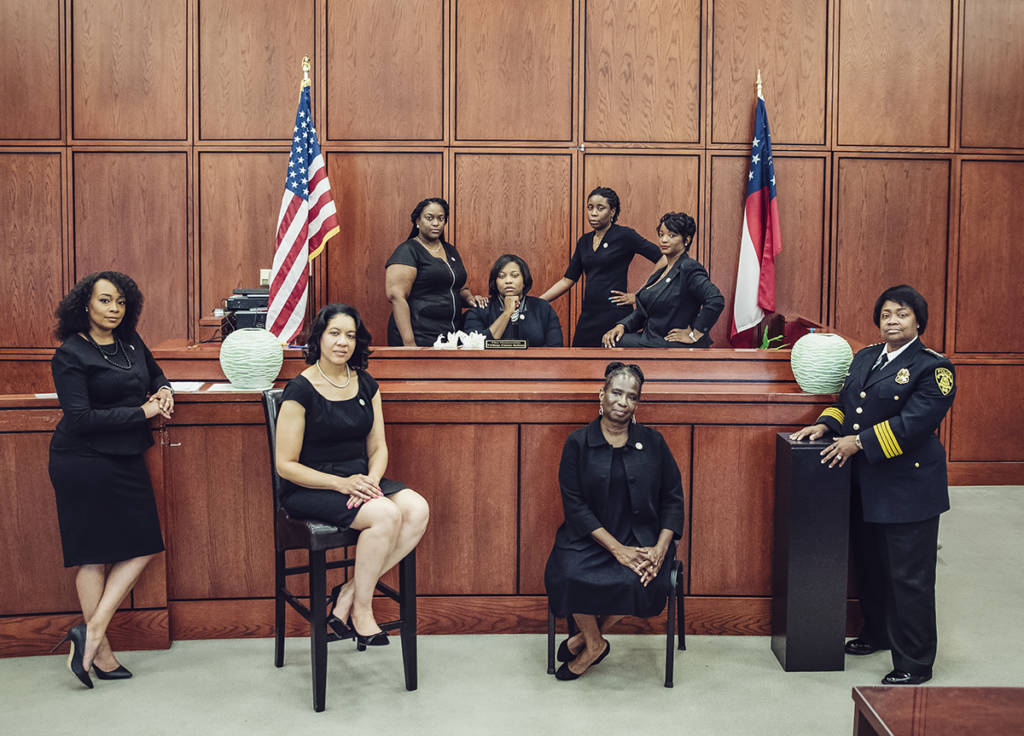
With the onslaught of police-led shootings and killings against Black men and women, unjustly rulings from the courts handing down years in jail, many wonder what it would be like if there were more men and women of color in the criminal justice system.
Well, one city has done it and has officially changed history.
The City of South Fulton, Georgia’s fifth largest city, is the first city in American history where every criminal justice department head is an African American woman.
Chief of Police Sheila Rogers is a career law enforcement professional with more than twenty-six years experience. Chief Rogers is the city’s first police chief and one of a few women police chief around the country.
Chief Judge Tiffany Carter Sellers is a University of Georgia law school graduate and the City’s first chief judge. Judge Sellers was selected through a panel of experienced judges from the surrounding community.
According to The Atlanta Voice, Judge Sellers hired and appointed the Court Administrator, Lakesiya Cofield, and the City’s first Chief Court Clerk, Ramona Howard.
Also appointed to represent the two equally important components of any criminal justice system were two attorneys, City Solicitor LaDawn “LBJ” Jones, who prosecutes the cases and City Public Defender Viveca Famber Powell, who defends those accused of crimes.
Together these African American women make up all the portions of the criminal justice system in the new city.
No other time in American history has black women been appointed to the top position in every department in an entire cities criminal justice system.
No other time in American history have women made up all of a city first.
This has never happened before...until now.
“Our goal is to ensure justice for everyone,” Sellers said to The Atlanta Voice. “However, as African American women we are sensitive to the history of criminal justice in our country. We want to be an example of how to do things right.”
There's something to be said about a town or city that has a large population of African Americans in the Criminal Justice system: the number of deaths decreases.
When black officers reach 25% ratio in the force, the rate of fatal police-involved incidents levels off. A 2015 study found that once a police department became about 40 percent black, the trendline flipped — the more black officers a department has after that point, the less likely the incidence of fatal encounters with black people. But the study suggests that what departments really need isn't just to simply add more black officers, but to reach a critical mass of black officers. In fact, so many black officers that they would be overrepresented relative to the local black population. (Very few local police departments reached that 40-percent mark. The researchers looked at the 100 largest cities in the country, and only 15 had police forces with that proportion of black officers.)
Under Sellers’s leadership, the demographics of the court are just the beginning. She has incorporated municipal court policies not found in other systems including guaranteed access to an attorney, a robust diversion program that is infused into the court process, and overall respect for victims and the accused alike.
Sellers insists on courtroom decorum that shows respect to the accused, victims, and visitors. The court also insists on giving each person and their case the respect they deserve from the moment they walk in the door.
Further, Sellers spends much of her time ensuring everyone fully understand what is happening in the system. The hope is to restore faith in the justice system for many of the citizens who have had less than stellar experiences in other courts.
The city’s pre-trial diversion program will allow offenders to keep a clean record in exchange for community service, education, and...
... counseling where appropriate. The diversion program, “Second Chance South Fulton,” is paid for by the court budget and overseen by the City Solicitor, LaDawn “LBJ” Jones.
Many cities of this size do not have diversion programs.
“One of the primary purposes of laws is to protect citizens and the city,” Jones explained. “You can do that without sending everyone to jail or enforce high fees. Most people do better when they know better.”
Another progressive component of the court system is the appointment of the public defender. In most jurisdictions, a public defender is only assigned after someone proves they cannot afford a private attorney.
In South Fulton, everyone that appears before the court has an opportunity to receive appointed counsel prior to making a decision on their case.
“Although we handle misdemeanors, the cases can have serious long-term effects on the person accused,” Powell said. “Having an opportunity to advise clients ensures justice is received by all.”
In all matters, whether it is the operation of the probation department or bond considerations, the city, as well as the rights of the victims and defendant are considered.
The City of South Fulton will grow as citizens looking for a place to settle chose to live in a community where they are reassured that the police and courts in their city will be partners in making the community better.
In the City of South Fulton’s justice system, African Americans are far less likely to be arrested, prosecuted, or detained in custody because of incidents like those seen in recent news. These assurances help law-abiding citizens, particularly African Americans, feel less tense when they see blue lights in their rearview.
In addition to making history, South Fulton may become an example for the rest of the country.









